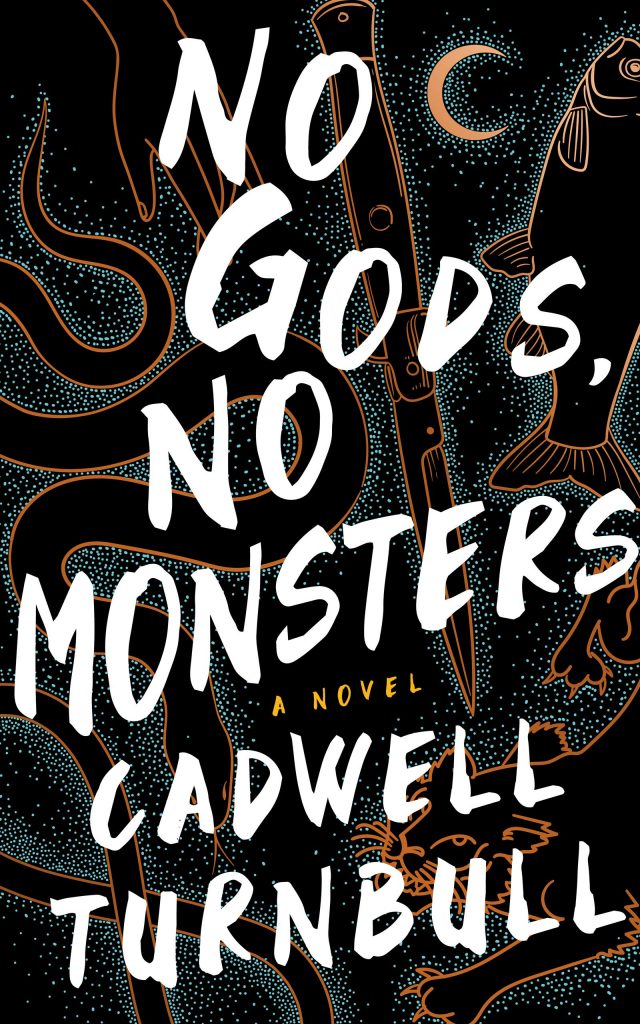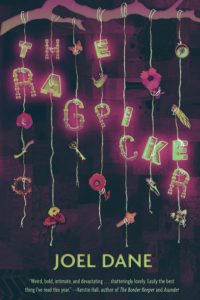Gary K. Wolfe Reviews No Gods, No Monsters by Cadwell Turnbull
 No Gods, No Monsters, Cadwell Turnbull (Blackstone 978-1-9826-0372-4, $23.99, 330pp, hc) September 2021.
No Gods, No Monsters, Cadwell Turnbull (Blackstone 978-1-9826-0372-4, $23.99, 330pp, hc) September 2021.
I have to confess that I’m probably losing track of all the monsters. There was a time, before even I was born, when Universal Studios effectively created the first multi-movie franchise by teaching a generation that monsters consisted of some very specific properties – Dracula, Frankenstein’s creature, mummies, werewolves, invisible men, all the way up to Creature from the Black Lagoon. In the 1950s, Toho Studios more or less repositioned the field away from the human-scaled monsters of Universal and toward the architecture-sized kaiju, which are still very much with us. Then, of course, there are the furry cuties of films like Monsters, Inc. and, in an entirely opposite direction, the use of the term to refer to real-world serial killers (Charlize Theron’s Oscar was for a film simply called Monster) and to the demonization of almost any marginalized or distrusted groups or individuals. It’s confusing, and it’s no wonder that ‘‘monster theory’’ has become a thing in academic studies over the past few decades. Even as I write this, Jeffrey Andrew Weinstock’s A Monster Theory Reader has just been nominated for a World Fantasy Award.
I’m pretty sure Cadwell Turnbull has given some serious thought to all this, since his impressively ambitious second novel No Gods, No Monsters interrogates the idea of monsterdom from a number of different angles. Following introductory chapters from a first-person narrator whose true role in the novel won’t become apparent for some time, it begins with a familiar image of transformation. Laina Calvary learns that her brother Lincoln has been shot and killed by the police – itself an all-too-familiar occurrence – but the actual video of the incident has been suppressed, and not for the reasons we might reasonably suspect. Laina hears a mysterious voice offering to get her the video of what really happened, and is visited by an attractive woman named Rebecca, who claims to have been Lincoln’s friend. After Rebecca leaves, Laina finds a thumb drive – possibly left by that mysterious voice – containing footage which reveals that Lincoln was actually a werewolf, changing back into his human body after being killed. That much is familiar even from the first Wolf Man movie, but Lincoln is barely the tip of the iceberg. Soon Laina sees a news report showing ‘‘a pack of large animals’’ forming a line across a highway, morphing into naked humans as she watches. One of them is Rebecca. The hidden monsters of the world, it seems, have decided to make themselves known.
A journalist dubs this event ‘‘the Fracture,’’ and it becomes the pivot around which Turnbull organizes his own somewhat fractured timelines, jumping from character to character and period to period (‘‘two weeks before the Fracture,’’ ‘‘one year after the Fracture,’’ etc.). The ‘‘monsters’’ turn out to not only include shape-shifters like werewolves (or bears or cougars), but witches, mind-readers, clairvoyants, and others with no outward signs of difference. Their sudden appearance inevitably leads to panic: people dive down Internet conspiracy rabbit-holes; hate crimes increase in general; others remain skeptical as to whether there are monsters at all. Laina’s husband Ridley, both biracial and trans, is familiar with marginalization and belongs to a collective whose mission is ‘‘to support the solidarity movement,’’ as their leader Melku explains:
Often, that has meant supporting marginalized people. Some of you are people of color, and some of you are part of the queer and trans community, like me. Many of the most vulnerable monsters are also a part of these communities, which is why redefining solidarity to include them is so important. In that spirit, I think we should extend our support to monsters since it is likely they’re already in the movement but have chosen to remain silent.
This is essentially the sentiment that Turnbull’s title is meant to echo. A variation on the old anarchist slogan ‘‘No gods, no masters,’’ it becomes a chant of the new solidarity movement, ‘‘a call against hierarchy and discrimination.’’
Turnbull is interested in far more than simply hauling supernatural critters like werewolves out from the shadows, a notion that goes back at least as far as Jack Williamson’s Darker Than You Think.
Soon there are rival secret societies of monsters, one of which traces conspiratorial connections to everything from the Order of the Golden Dawn to Scientology. One of the most touching figures in the book is a child monster called Dragon, whom we first meet as he’s forced to eat the burned flesh of sacrificial victims; another is Harry Shiner, one of those victims, an academic escaping from a failed marriage; others include Sondra and her adopted soucouyant sister Sonya; yet another is the Rebecca who we met earlier. These and a plethora of other characters are given such evocative backstories that they seem ready for their own novels; Turnbull’s capacity for economical character development is one of the more impressive aspects of No Gods, No Monsters.
The most intriguing of these figures, and perhaps the most important in terms of what it portends for later volumes in the Convergence Saga (this is only volume one), is Calvin, who unexpectedly steers the whole story in the direction of SF. We’ve been given earlier hints of SF connections – the bookstore where Ridley and Laina work is called Anarres, in a direct tribute to Le Guin’s The Dispossessed, and Ridley himself rather pointedly muses at one point that The Lathe of Heaven seems to prefigure the world he finds himself living in (‘‘Now he sees all the ways reality can be written and unwritten before his very eyes’’). But with Calvin, who spends most of the novel as an anonymous or even invisible observer, No Gods, No Monsters goes full multiverse: Calvin learns he can freely move, in both space and time, among all parallel versions of Earth except his own, and he even visits a few different iterations of quantum theorist Hugh Everett himself. Even though what we learn about Calvin is limited, his role seems to be to expand the scope of the novel almost exponentially, to help knit together the disparate narrative threads (a few of which are ragged enough to leave some readers frustrated), and presumably to set up the conditions for subsequent volumes. Apart from its huge and diverse cast of fascinating characters, its passionate consideration of alienation, otherness, and solidarity, and its cheerful disregard of genre borders, No Gods, No Monsters leaves us with only tantalizing notions of where later volumes may lead. That by itself is pretty refreshing: no gods, no formulas.
Gary K. Wolfe is Emeritus Professor of Humanities at Roosevelt University and a reviewer for Locus magazine since 1991. His reviews have been collected in Soundings (BSFA Award 2006; Hugo nominee), Bearings (Hugo nominee 2011), and Sightings (2011), and his Evaporating Genres: Essays on Fantastic Literature (Wesleyan) received the Locus Award in 2012. Earlier books include The Known and the Unknown: The Iconography of Science Fiction (Eaton Award, 1981), Harlan Ellison: The Edge of Forever (with Ellen Weil, 2002), and David Lindsay (1982). For the Library of America, he edited American Science Fiction: Nine Classic Novels of the 1950s in 2012, with a similar set for the 1960s forthcoming. He has received the Pilgrim Award from the Science Fiction Research Association, the Distinguished Scholarship Award from the International Association for the Fantastic in the Arts, and a Special World Fantasy Award for criticism. His 24-lecture series How Great Science Fiction Works appeared from The Great Courses in 2016. He has received six Hugo nominations, two for his reviews collections and four for The Coode Street Podcast, which he has co-hosted with Jonathan Strahan for more than 300 episodes. He lives in Chicago.
This review and more like it in the September 2021 issue of Locus.
 While you are here, please take a moment to support Locus with a one-time or recurring donation. We rely on reader donations to keep the magazine and site going, and would like to keep the site paywall free, but WE NEED YOUR FINANCIAL SUPPORT to continue quality coverage of the science fiction and fantasy field.
While you are here, please take a moment to support Locus with a one-time or recurring donation. We rely on reader donations to keep the magazine and site going, and would like to keep the site paywall free, but WE NEED YOUR FINANCIAL SUPPORT to continue quality coverage of the science fiction and fantasy field.
©Locus Magazine. Copyrighted material may not be republished without permission of LSFF.




